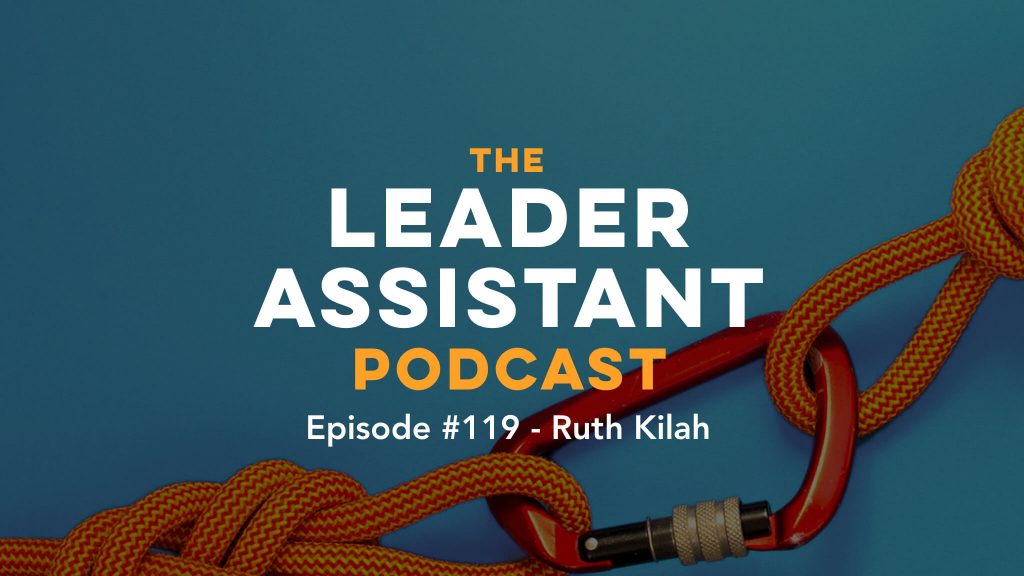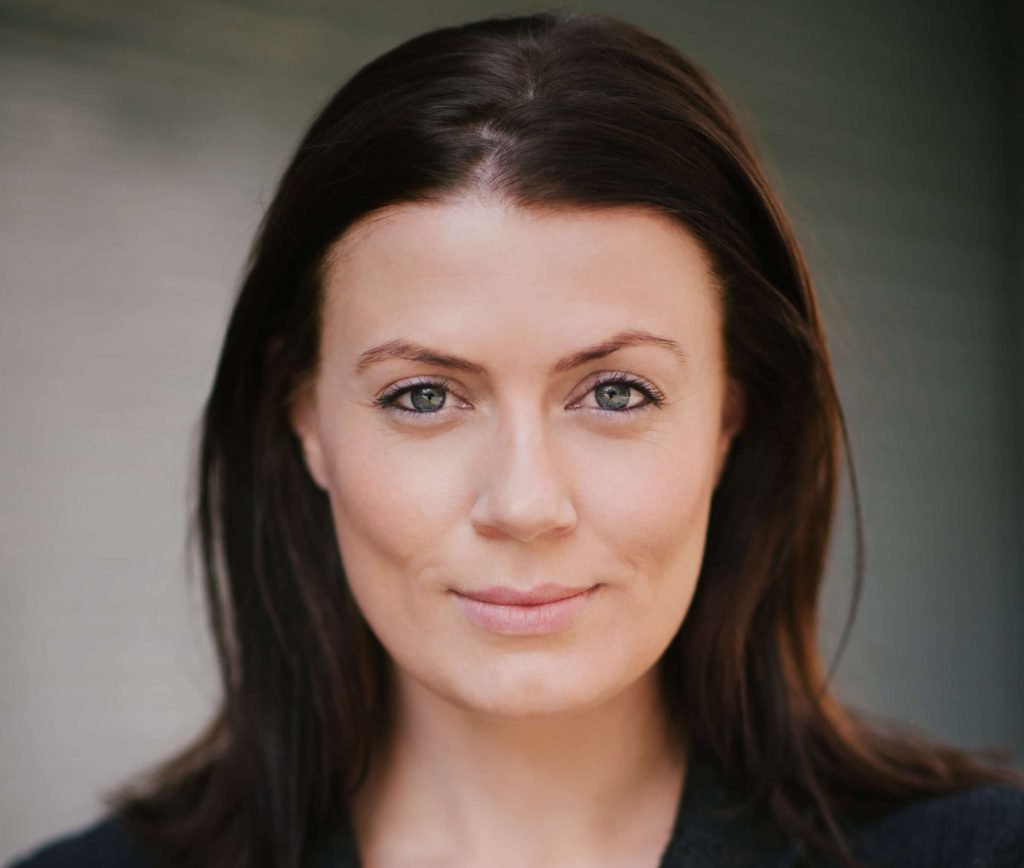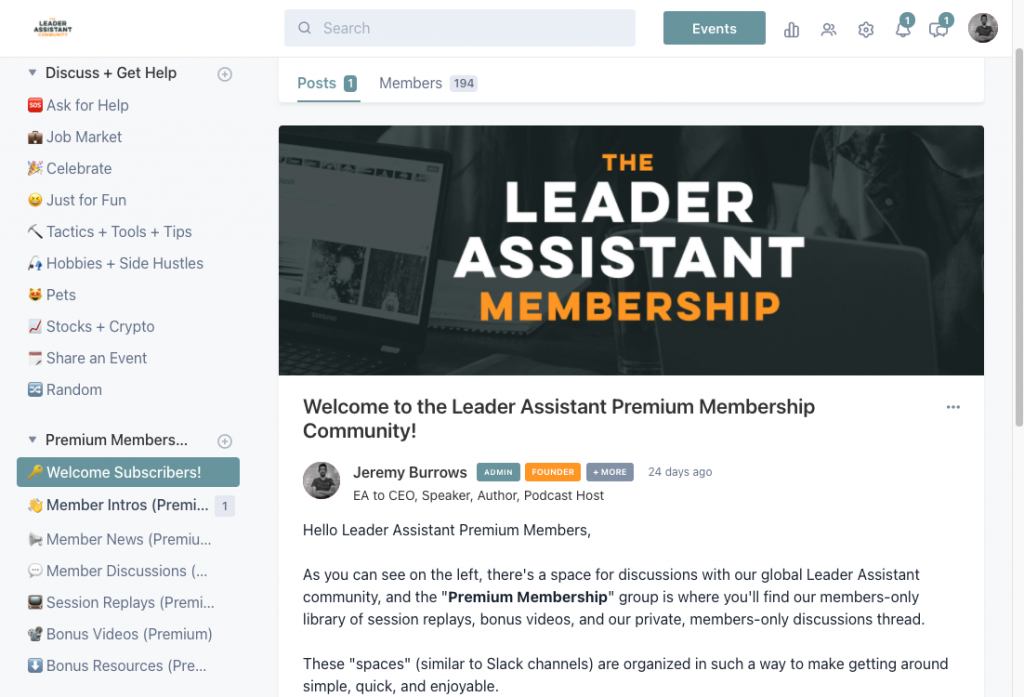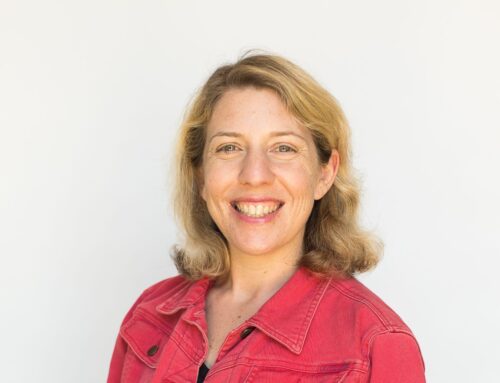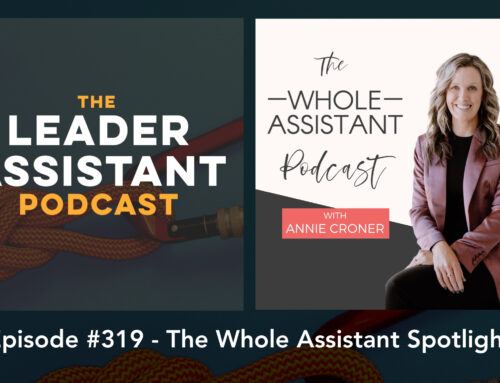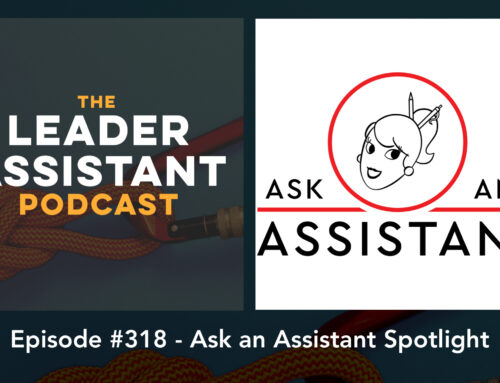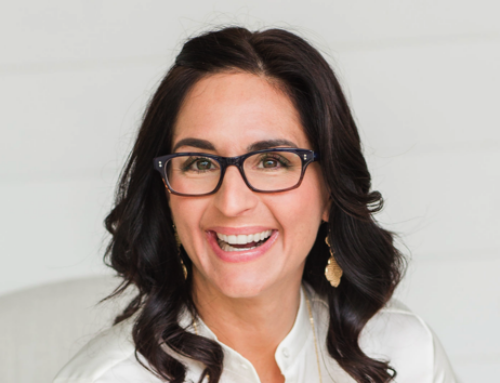Ruth Kilah is the Founder and CEO of Hoxton Hyde, a workshop and online course provider that helps assistants increase their productivity and prioritize work life balance.
In this episode, Ruth and I discuss recognizing burnout, setting up and communicating boundaries with our executives, and how productivity improves when we slow down and prioritize our health and wellbeing.
THIS EPISODE’S SPONSOR
SwipedOn is the fastest-growing visitor and employee management software. With tools like contactless sign in, visitor screening, and evacuation management, SwipedOn can provide the peace of mind every assistant – and their team – deserves.
So the next time you hear, “What’s your plan for the office as we return to work?” or “How will the hybrid workplace look for us?” you can respond confidently, knowing SwipedOn has you covered.
To learn more or sign up for a FREE 14-day trial, visit swipedon.com/leaderassistant* today, and when you’re ready to move forward, be sure to use my exclusive discount code; LEADER20 for 20% off their annual plan. (*This is an affiliate link.)
LEADERSHIP QUOTE
When you say ‘yes’ to others make sure you are not saying ‘no’ to yourself.
– Paulo Coehlo
CONNECT WITH RUTH
ABOUT RUTH
Ruth is the Founder and CEO of Hoxton Hyde, a workshop and online course provider that helps Administrators and Assistants to increase their productivity and prioritize work life balance.
Ruth is a certified Fitness and Wellness Coach and is fiercely passionate about the benefits active living has on our physical health, but equally our mental well-being.
Hoxton Hyde, educates, empowers, and equips Admins and Assistants with tools and techniques to help them efficiently manage work but also how to prioritize a healthier lifestyle that works for them.
As a former Senior Executive Assistant and Project Manager, Ruth has over 13 years’ experience in managing time for C-Suite Executives in Australia and also in the United Kingdom, predominantly for large global corporations.
THE LEADER ASSISTANT PREMIUM MEMBERSHIP
To learn more about how you can join the now 200+ growth-minded Leader Assistants, check out our Leader Assistant Premium Membership for ongoing training, coaching, and community.
LEADER ASSISTANT LIVE EVENTS
Check out our constantly updated schedule of events for admins and assistants at LeaderAssistantLive.com.
THE LEADER ASSISTANT BOOK
Download the first 3 chapters of The Leader Assistant: Four Pillars of Game-Changing Assistant for FREE here or buy it on Amazon or Audible.
JOIN THE FREE COMMUNITY
Join the Leader Assistant Global Community here, or the Facebook Group here for bonus content and to network with other assistants who are committed to becoming leaders!
SUBSCRIBE
Subscribe to The Leader Assistant Podcast so you don’t miss new episodes!
You can find the show on Apple Podcasts, Spotify, Google Podcasts, Pandora, and Stitcher.
Join my email list here if you want to get an email when a new episode goes live.
LEAVE A REVIEW
If you’re enjoying the podcast, please take 2 minutes to rate and review the show on Apple Podcasts here. Each review helps me stay motivated to keep the show going!
—
EPISODE TRANSCRIPT
Ruth Kilah 0:00
Hi, I’m Ruth Kilah from Hoxton Hyde. And today’s leadership quote is when you say yes to others make sure you are not saying no to yourself from Palo que.
Podcast Intro 0:15
The Leader Assistant Podcast exists to encourage and challenge assistants to become confident game changing leader assistants.
Jeremy Burrows 0:23
Thank you for listening to The Leader Assistant Podcast assistance our workplace heroes, and as such transitioning safely and securely from remote work to an in office environment is top of mind. And we all know that every superhero needs a sidekick. Enter today’s sponsor swiped on swiped on is the fastest growing visitor and employee management software with tools like contactless sign in visitor screening and evacuation management swiped on can help provide the peace of mind every assistant and their team deserves. So the next time you hear what’s your plan for the office as we return to work, or how will the hybrid workplace look for us, you can respond confidently knowing swiped on has you covered. To learn more or sign up for a free 14 day trial visit swipedon.com/leaderAssistant that’s swipedon.com/leaderassistant. And when you’re ready to move forward, be sure to use my exclusive discount code for 20% off their annual plan. The discount code is leader20. That’s leader20 for 20% off their annual plan. So reopen your business safely today with swiped on. Hey friends. Thanks for tuning into The Leader Assistant Podcast. It’s your host Jeremy Burrows. And today I’m speaking with Ruth Kilah. Ruth is in Australia. Is that right, Ruth?
Ruth Kilah 2:06
Yeah, that’s right, Jeremy.
Jeremy Burrows 2:08
And could you tell us a little bit about what you do? And then we’ll get into a little bit about how you ended up there?
Ruth Kilah 2:16
Sure. I am a I’m a productivity and wellbeing strategist. And I am the founder of a company called hawks and hide, which assists, helps administrators and assistants to increase their productivity and prioritize work life balance. And I started this business a couple of years ago. And we’ll be launching a course next month.
Jeremy Burrows 2:47
Awesome. And you have extensive experience as a senior executive assistant, can you tell us a little bit about your career as an assistant?
Ruth Kilah 2:57
Yeah, sure, no problem. Yeah, like, like many assistants, I fell into it. It wasn’t a strategic move. I actually started after graduating from business degree, I started in a sales role in hospitality in London, and I was only in that role for about a year, just over a year when my role was made redundant due to a restructure at the hotel. To which I took that opportunity to do of traveling around Europe. And upon returning to London, I decided to make a change with my work. And I loved the hospitality industry. But I felt that I wanted to really make the most of my opportunity there in the United Kingdom to be able to do lots of travel and a lot of the shift work that I was doing in the hospitality sector wasn’t allowing that amount of travel that I wanted to do. So I just thought, you know, I’ll broaden my wings and explore other avenues. So I decided to take up temping or temporary work within the administrative function in London and I did that for about six months. I started off I think the first role was switchboard. So I don’t know if you’ve Jeremy have done that role role, but it’s very, very high pressure for First off ministry role. And then there was what kind of receptionist role and all sorts of coordinator positions, and I didn’t get I did that for six months. And each role I didn’t stay in for more than about two weeks, which gave me great exposure to different industries, different roles, different leaders, and different organizations that I could possibly work with and turned out nearly every role that I I was in to preposition for offered me a full time position, which was wonderful. I mean, I didn’t I just kept on tamping, because I wanted to have that flexibility at the time. But it was a wonderful way to develop my career there and kind of gain a bit of exposure. And after six month, I took a temporary position covering a position for a personal assistant or executive assistant role, whilst the full soul searching for a full time executive assistant role, and I whilst I was there, I decided to apply for it. And I got it. And so I went in, after no experience for six months went into a to CEO role. And I must admit, a lot of that was backing myself, even though I was going into complete uncharted territory, because it was for a CEO who was doing a lot of international travel for a large accounting consultancy firm, global one. So, yeah, it was a highly pressurized, full on role. And, as I said, lots of international travel board meetings, etc. And I learned a lot very fast. I was definitely very green. And I definitely said yes to everything. And as a result, I was continuously unwell and burned myself out a number of times during that role. But as I said, I learned a lot a lot about the profession, but also about myself. So this is a long winded story about my background. Yeah, living into this isn’t space anyway.
Jeremy Burrows 6:50
Yeah. So tell us a little bit about your burnout. What was kind of maybe some signs or did you learn any kind of triggers? I guess the you now can kind of keep an eye out for to know that you’re heading down that path again, or you might be heading down the path of burnout.
Ruth Kilah 7:15
Yeah, sure. My tip back then I used to get my turned out with cold sores, my lip, and which I don’t get any more, which is amazing. So and that can be downright annoying little things. And I used to get them almost like you know, they would appear and then you know, be on my left for, you know, a week or better. So annoying, so ugly, and they would then disappear. And then a week later there appear again. And that was my like milking back now, that was my telltale sign that I was getting so rundown, my immune system was at zero. I just was always picking up every illness and just constantly felt fatigued, really tired. So I would say those, it’s like those key things like for some people, you know, they easily get a sore throat, or they’ll easily get a migraine, or they’ll easily maybe like myself get a cold sore or something like that. There’ll be a telltale sign that will be in repeat behavior or a pattern that should be telling a story and it’s telling you sending you a message. So for me it was that, that it was always that something had to change.
Jeremy Burrows 8:34
Yeah, your body’s trying to tell us Hey, slow down. And we’re just like, Yeah, you know, we’re just, we’ll just keep going.
Ruth Kilah 8:42
Yeah, exactly. Yeah. So then me to pay attention to ourselves.
Jeremy Burrows 8:47
Yeah. So then in your next role, or next couple of roles as an assistant. You end up you worked at GE for a while. Is that right? Yeah, yeah. So So I am still started pushing hard and you know, pushing through the burnout or did you kind of have a reset before you got to that role?
Ruth Kilah 9:07
Yeah, so in the middle of that. So from when I moved back to Australia is when I was starting, I worked for General Electric. And that’s when I completely reset. It was taught actually, towards my end of my career at when I was living in London is when I when I started to make that change with how I worked and how I lived my life. But yeah, it was a complete different reset when I came back to Australia and started working for GE I definitely was working very, very differently. Well, I don’t Yeah, I don’t I think I think well the for me it was during when I was towards the end of my career in London is when I committed to running a the Paris marathon. I’m deciding to kind of do something different and bold. And it was through that process of committing to so many hours of training, that I realized that you can’t burn yourself out at work, you really, if you want to be fit and healthy and commit to a run like that, you need to look after yourself, mind and body to be able to perform. So it was during that process that it also reflected in my work as well, because I realized there was more more to just working longer hours, I enjoyed my work, and loved being an assistant loved it. But I also realized that there was more to it more to work than what a life sorry, should I say than work? So? Yeah, definitely. Spending that time exercising and training was a wake up call and decided that change in terms of how I would live my life.
Jeremy Burrows 11:05
So for those listening, myself included, who are like, I don’t ever want to run a marathon? What can we do to start taking care of ourselves. And if we do, see and recognize that we are burning out and our bodies are trying to tell us, hey, you need to, you need to slow down, you need to take care of yourself, what are some things we can do other than running a marathon?
Ruth Kilah 11:32
It look, it’s very everyone’s different everyone, their version of what is healthy, unhealthy lifestyle, what is meaningful for them is different. So going back to that first thing about listening to your body, and what you need, but also, when you want to start that process of looking after yourself, you need to just, first of all sit down and realize what’s important to you. Is it not just the healthy exercising and eating the right food, but what else is important in my life? Is it my family? Is it my friends, is it time for myself to develop personally as well. So in terms of the you know, the initial health, healthy eating and exercise are moving your body more, it’s just paying attention to all the aspects in your life which are meaningful and give you wellness and balance and give you a feeling of fulfillment in those areas. So my view, my first initial kind of suggestion would be for you all to kind of look at your life holistically. And, and see not just from the exercising and food part of it, but what is also meaningful to you, and it’s gonna give you back. Fulfillment.
Jeremy Burrows 13:07
So if, you know, let’s say family is important to me, do you have kind of a process that you take your clients through to, you know, guide them to a couple of practical tips on wellness?
Ruth Kilah 13:28
Yeah, and that is, I get clients to sit down and work through. If it’s family that’s important to you to what is what does that look like, and be really specific visit how frequently where and how, and, and to really make focused time for family if that’s important for you in your in your well being is as a prime priority for you, and to make and to make the time and when I say make the time you block the time physically in your calendar. Because life is so busy, and interruptions occur all the time. And sure there’s going to be interruptions of work, you know, urgent stuff will pop up. But without those constant reminders that you know, maybe you have a family dinner every week with your extended family or you want to attend, you know, family sporting events with your children each week or pick them up from your kids from school or those kinds of activities unless they’re in your calendar unless you make time for them and really prioritize them. They they’re so easily to be overwritten by other people’s priorities.
Jeremy Burrows 14:57
Yeah, like the There’s a executive podcast host named Pat Flynn, I’ve actually interviewed his amazing assistant Jesslyn grin in one of my prior episodes. His one of his kind of vision or missions in life was to be able to pick up his kids from school every day. And so whatever he was doing his business, he wanted to have the flexibility to pick them up from school every day. So even just simple things like that, when, like you said, like blocking those off, adding that to your calendar, yeah, can be very powerful.
Ruth Kilah 15:37
Yeah, and I always say to assistants, like, that’s important to your leader. Don’t be afraid to communicate, if that’s something that’s important to you. People value people who share their values. So if your leader is communicating to you that they really need to go and pick up their children at x time, then don’t hesitate to have that conversation and say, it’s really important, this is something that I’d like to do every day, how can we maybe work this into, you know, it might not be every day, it might be every second day or third day, I don’t know, in terms of what that could look like for everyone. But I always say, don’t be scared to have that conversation. Because you never know, if you don’t ask. And I’ve met plenty of assistants that are so so so scared to take the hat off that conversation to have that conversation with their leaders. And, and when they do, they’re in complete disbelief. And, and shocked and, you know, they and now kicking themselves, they shouldn’t have asked earlier that they for that, for that allowance, which is just so small, but it’s so meaningful to them, whether it be you know, family time or time to go to the gym, or go for a walk at lunchtime, or to have maybe a delayed start to their day because they want to be able to drop off their child, you know, kind of any of those kinds of arrangements. So yeah, I always say I always say to people are never don’t be afraid to ask.
Jeremy Burrows 17:17
Yeah, I remember talking to an assistant years ago. And he was like, Yeah, my executive likes it when I take, you know, a long lunch break in the middle of the day and get a quick workout in because I’m more alert and productive the rest of the day. Yeah, on those days that I do that.
Ruth Kilah 17:42
Yeah, it’d be fine. All cylinders. Yeah, absolutely. Uh, you know, you’re, by getting out of moving, you’re honest. People don’t believe me. But if you get out of your seat at lunchtime, and just move, whenever you have lunch, that is, you know, just moves your body, come back. And you’re, I swear, you’ll be firing on all cylinders, when you come back. Because you you’ve, you’re you’ve moved your joints, you’ve used your muscles, and you’ve got your blood pumping through your body, and your brain will be far more active on and on fire to be able to tackle the afternoon.
Jeremy Burrows 18:18
So I love how you talk about even in your bio, you talk about how you’re a certified fitness and wellness coach. And you’re also a productivity and well being strategist, there’s this oftentimes in the world we fight, or there’s a tension between productivity and the health and wellness. Or, you know, it’s like, oh, well, you know, if I’m going to be productive, I’ve got to, like, sacrifice my health and my late nights, and I just got to work more I got to work faster and harder. But the reality is, you know, and even some of the top leaders in history they take naps in the middle of the day. You know, yeah, yeah. It’s like the people that are truly productive. And, you know, truly game changing. Have that opposite. You know, the anti hustle vibe, if you will. So, anyway,
Ruth Kilah 19:25
ya know, it’s a that’s it’s, I always say to people, you know, the, it’s always the siesta is wish that was more frequent. Because, you know, like, we all have different working styles and working rhythms. Some of us are more productive throughout the day, in the morning, sorry, in the morning, some of us in the afternoon and some of us overnight and some of us are productivity, we’re always switched on. So it’s very hard for us to switch off. So we have bad sleep patterns. Some people have just, genetically I have bad sleep patterns. Because usually very highly intelligent types. And as a result, they need more frequent rest periods throughout the day because they are not, don’t have like a you know, they’re not really switched on in the morning or, or predictively switched on the afternoon or at night, it’s kind of all sporadically throughout the day and night. So those types of people actually would benefit. It doesn’t surprise me that leaders in high positions, highly intelligent individuals would require a siesta and would schedule that is a very smart and intelligent thing to do, actually.
Jeremy Burrows 20:36
Yeah. So what would be your advice? And you know, a lot a lot of people right now are working from home and may still be working from home and remotely for a while, at least, probably even more so than before the pandemic lizard more hybrid remote in office, you know, opportunities? What what are your top two tips for those listening? When it comes to you know, you mentioned get up and move around at lunch, things like that, just just simple practical tips that they can just start doing today to really help them be productive and also prioritize their health.
Ruth Kilah 21:25
Yeah, I would say that it can it can be really difficult working from home for a lot of people. And Jeff, you definitely need to create a make sure you create boundaries between work and and tow life. As you know, there’s so workaholics and, but they’re also engaged workaholics, like myself who I could work all day, every day, because I love my job. It’s not. As I say, s&p will say it doesn’t feel like work. So, but I still create boundaries, because I need to invest time. And so I want to spend time with all my other priorities in life, family, friends, home life, for example. So I would say with people, when they’re working from home is to ensure you have structure to your day and that you you know, block time as if you were working in the office block time to go for lunch, set reminders that pop up the you know, that you’ve got lunch break coming up so that you treat it as if you’re working in the office. And step away from your desk, go and have your working at home, step away from your your desk, your computer and go and have lunch in the kitchen or outside depending on the weather. And, and after your lunch go for maybe go for a walk or go to the gym or move your body. And then when you’ve you know, gone for a walk or move your body come back to your desk and start working again. I think a lot I find a lot of people when they’re working from home. And I know historically for myself, it’s the end of the day, that becomes quite tricky. I’m lucky enough that I have kids to pick up from preschool and daycare. So I kind of have a hard stop. But if I need to I dip into any work in the evening. But I really aren’t. It’s very rarely that I do. But I usually have got a hard stop reminder on my calendar to go and pick up kids. And for those who don’t have kids or that kind of other other people in their life that need to kind of help make a cut off the end of the day, I would encourage you again, creating a reminder in your calendar that the end of the day is coming up and just to help wrap things up for that that day. And therefore signal D at the close of the close of business essentially for you for your work. I realized that assistants are essentially always on call and not always on call. However, if you if if you are someone who wants to make a change to your work life balance, the biggest, biggest hurdle and the biggest key is communication. And that is communicating with other people around you what your your boundaries are whether the beginning of the day or the end of the day. So communicating with your manager, with your leader, your executive on what those boundaries are being the day in the day, you know, sharing with them, you know, I’m going to be I’ll be at my desk at 8am or whatever that time is or 7am I don’t know what in terms of in the US predominantly let people start work but you know, communicating that and also, you know, the end of the day as well communicating what your you’re doing, and I’m going to be going for a walk at lunchtime. There’s no There’s no shame in that. I think that’s the one single most beneficial and piece of advice I could give his give is not only can implement boundaries, but communicate them. communicate them.
Jeremy Burrows 25:16
Yeah. Yeah, I mean, that’s the game changer for me. And my current executive is, you know, my prior executive, I burned out and he burned out. And we didn’t have any, any clear boundaries. And we just kind of worked all the time, anytime, everywhere. And my current executive, I sat down, I was like, Listen, I need boundaries, so that I can be the best assistant for a long time and not burned out again. So yeah, we shut shut off emails on the weekends, and don’t bug each other on the evenings and weekends, unless it’s urgent, and we work, you know, like crazy during the odd hours, and we rest well, during the off hours.
Ruth Kilah 26:00
Yeah, we found one of my more recent or last executives I work for. We had a similar kind of friendship, you know, when we were at work, we were on and execute, execute, execute. But outside that, you know, she could reach me, but she tended not to and only on emergencies. That’s another big tip I always say to people is if you have a work phone, if you can, try and keep a personal phone as well. So you have that separation. And I find that, yes, it can be sometimes a little bit inconvenient to take to phone somewhere. But go back to that conversation with your leader about that you’ve just said into kind of sitting down with him and say, Look, you know, my phone’s gonna be with me at home. But you know, I’m not gonna check it, my email over the weekend, if there’s something critical, urgent, just give me a call. And I’ll get straight to it. And I definitely had that conversation probably gonna last for three or four liters. And the response to that was fantastic. No problem. And they really called me so. Yeah, it goes back to communication. Yeah.
Jeremy Burrows 27:21
So when you were excelling in your career? And, you know, can you reassure us that when you prioritize your, your well being and when you communicated those boundaries? That it, it did not stunt your progression up the career ladder? That makes sense?
Ruth Kilah 27:47
Oh, absolutely. Not. If anything, if anything, it progressed it anyway. Yeah. I mean, when I was with the numerous latest that I’ve worked with, towards the end of my career, whenever I communicated with them, you know, I actually said to them, you know, I like to work from home one day a week, because I find it’s a good breakup of my workweek you in the office, we’re working in an open plan type office, which is great for networking, but it can be really disruption to your productivity. And I communicated with them that, you know, I would like to do that continue doing that. And their response was, oh, great, I might do that, too. So, you know, and actually, at one point, I think we kind of we agreed at once, to, to work, I think, Tuesdays and Thursdays to do two days a week, to break up to be found that we’re more productive, both of us when we’re working from home certain weeks when there was a lot of work on so and especially in terms of exercise, and taking lunch breaks away from my desk, I never very, very rarely I can’t actually remember ever sitting at my desk eating lunch. But I it was a simple conversation around saying to a manager, look, I really enjoy exercise, I really enjoy going to the gym. And I I see that my by doing this I am investing in my health and well being in order to be the best that I can be in this role. And you know, there was never an issue. And they could always see that. When I was on the in the office I was always delivering I was on I was never not involved and delivering on what I was doing. So it gave them no reason to question that. And I think I always say to other people, if you look take a look around you. You know going back to that A leader that you were talking about previously, Jeremy, who left the office every day at a certain amount of time, in order to pick up these kids, well to that, I, if that man was in my office, I would be so respectful of that. And I know that he he has a heart holds his children and family in such high regard. And one of his key value points that I really respect that. And I think that goes to the same for a verse if we share our values, and what’s meaningful, important to us. And we share it with others, others will respect that. And, and it’s all about training as well training everyone around us to get used to what’s what we do what’s normal for our working hours as well. I think sometimes people are fearful of change, and sometimes others may have their opinions about, you know, what it is to be productive. But what takes you might might take you five minutes, it might take me 20 minutes to do. So why should you be? My view is why should you be will have to stay in the office? Or should I want you so you stay in the office longer, if you’ve already completed something, and I’m still working on it, you know, me to spend longer on it. Or maybe I’ve been more than distracted in the day or talking more to people or, you know, looking at my phone, not actually doing work. So it shouldn’t be on about hours, that you’re sitting at your desk.
Jeremy Burrows 31:32
Yeah, that’s one of my favorite parts about the way the world is shifting in the way the pandemic has expedited the shift to kind of this hybrid remote work model. I mean, even a lot of companies, I saw a Twitter thread the other day about these executives talking about the four day work week, and how, you know, some companies are testing it out and saying, you know, let’s just do a four day workweek. It’s quite
Ruth Kilah 32:01
a few in Australia that are doing it. Yeah, it sounds fantastic. Yeah, it’s not
Jeremy Burrows 32:04
about, you know, just being in the office, you know, 4050 hours a week, it’s about being productive and getting your stuff done. And if you can get that stuff done in three or four days, why waste time sitting around? Trying to fill the time, like you said, checking your phone or chat chatting it up, or whatever. So yeah, yeah, it’s there’s a little more flexibility in the corporate world, slowly but surely.
Ruth Kilah 32:32
Yeah. And I guess that’s my, my whole premises, then going back to what you’re saying that, you know, historically, the link between productivity, and your work life balance doesn’t really go together? Well, in my opinion, you can’t have a work life balance without productivity. You, you need to ensure you are or know how to be productive in order to allow yourself to have a really good life, work life balance. And when I say work life balance, essentially life balance. And that looks different for everyone, every one of us than this. It’s about what makes sense for you. But it’s about knowing how to be work efficiently and productive in order to work on the right things. And what are your priorities and to allow yourself to have or create a life that is balanced, whatever that is for you.
Jeremy Burrows 33:40
Yeah, well said. Well, Ruth, thank you so much for chatting with us today. How can we find out more about Hoxton hide and reach out and connect with you to learn more?
Speaker 1 33:55
Sure, you can find me more on LinkedIn. My name Ruth Kilah Instagram, which is Hoxtonhide which is HOXTONHYDE or via my website which is www.Hoxtonhyde.com.au.
Jeremy Burrows 34:17
Great, and I’ll share the links in the show notes so it’s easy for people to find you. And then just to wrap up real quickly, what makes an assistant a leader
Ruth Kilah 34:29
many many things, but I believe a true leader is someone who is passionate in investing and learning all the time and is hungry to learn all the time. And you know, it’s not necessarily structured learning but have asked questions at the in the workplace. continually ask them the question why and to, to, to never stop being inquisitive and that’s the only way we’re going to you only get to expand your learning and it’s it’s amazing sometimes when you just ask simple questions, the question, the simple question of why so, yeah, I would say, learning and development in all areas.
Jeremy Burrows 35:21
I love it a leader assistant is inquisitive. Yeah, very powerful and sounds real classy to like. Awesome. Well, thank you so much for taking time out of your day.
Ruth Kilah 35:39
Absolute pleasure, Jeremy.
Jeremy Burrows 35:40
Hopefully we can meet in person someday. I’d love to make it out to Australia. Yeah, absolutely. Yeah. Good luck with everything you’re up to. And thanks for your passion for the assistant community.
Ruth Kilah 35:53
No problem. Thanks, Jeremy.
Jeremy Burrows 35:55
Thanks again for listening. Check out the show notes at leaderassistant.com/119.
Unknown Speaker 36:13
Please loom you on Apple podcasts. Goburrows.com

